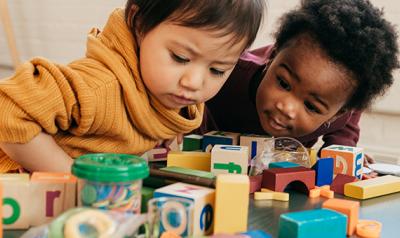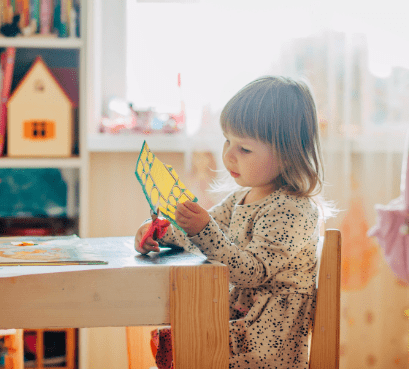We all know that children love to play. However, there is much more to play than simply having fun. Learning through play is crucial in early childhood development and helps children make sense of the world around them. In fact, UNICEF reinforces that play is one of the most important ways that young children can gain essential knowledge and skills.
What is Learning Through Play?
Most infants and young toddlers are not ready to sit still and listen in order to gain experience with new concepts and ideas. Instead, learning through play allows young children to grow their cognitive abilities by observing, doing, and collaborating when they play in the environments and with the toys, objects, and people that are around them.
When children engage in play, they are most likely not aware that they are expanding their minds. Although, play naturally creates powerful educational opportunities in just about every area of your child’s development! There are two primary types of learning through play: free/child-led play and active/parent-led play.

Free/Child-Led Play: Free or child-led play is a type of learning through play that is primarily directed and controlled by the child rather than the adult. Although, adults are expected to observe and interact with the child if the opportunity arises. The only thing you need for child-led play is any object or toy that your child is interested in at their age. This might be a ball, a toy truck, or even you and the funny faces or noises you make when you’re together.
Active/Parent-Led Play: Active or parent-led play is a type of learning through play that is primarily directed and controlled by the parent rather than the child. Goals for the child are planned by the adult. Then, the child participates in play-based activities related to and designed to meet those goals.
Benefits of Play for Early Childhood Development
Play is extremely important for young children’s development and as a parent, you are your child’s first teacher. Much of the teaching you direct to your child at an early age comes from learning through play. Play starts when your child is an infant and helps them develop critical skills related to what is expected of them, how they should act in society, and more. Here are just a few of the many benefits of learning through play:
- Improves Motor Skills
Gross motor skills, which occur first, are the movements your child makes with their larger muscles such as their arms and legs. Later on, young children will develop fine motor skills. This type of motor skill pertains to actions they take using smaller muscles such as their hands, fingers, and wrists.Throughout childhood, learning through play activities such as crawling, climbing, reaching, and grabbing work to develop necessary motor skills needed later in life. For example, walking, running, and writing. Ultimately, play benefits children’s motor development by encouraging movement, supporting balance, and understanding the idea of space.
- Fosters Effective Language and Communication Skills
For infants, learning through play fosters effective language and communication skills through the experiences they have with people and the objects around them. When infants engage in non-verbal communication such as making sounds, caregivers typically respond positively or imitate these sounds. This reinforces the infant’s understanding that their behavior has an effect on others. As a result, infants will continue to produce more sounds to create a response from others which sets the foundation for later social experiences.
For toddlers, learning through play can foster effective language and communication skills through positive and educational play. As toddlers begin to develop verbal communication skills, they will imitate the behavior and language of others. Interacting with parents and other playing partners enables them to focus on the sounds of speech by listening to others. In addition, when parents participate in simple activities with their toddler such as rolling a ball back and forth, it helps develop ideas such as taking turns. The idea of turn-taking is important for the development of interactive and conversational skills.
Builds Problem Solving Skills
Learning through play also supports the development of problem-solving skills in infants and toddlers. Young children are constantly exploring and often make accidental discoveries. For example, hitting a button on a toy and hearing it make a sound. However, over time, they will realize that they were, in fact, the ones who made the toy make a sound. As a result, they will be able to understand that they can purposely carry out these types of actions on the toy.Helps With Processing Emotions
Infants and young toddlers are not able to understand and verbalize how they feel. Although, through play, your infant or toddler is given an outlet to express their feelings and emotions in healthy ways. For example, playing with their favorite toy can help reduce any stress or frustration they may be experiencing. Learning through play helps build your little one’s creativity through pretend play.Promotes Creativity
Toddlers typically begin to participate in pretend play between 14 and 18 months. Through pretend play, your toddler is able to break out of reality, come up with their own ideas, and bring them to life. For example, by imagining a cardboard box as a car or building blocks as a house. As a result of using their imagination, it increases their creativity and ability to imagine even bigger things.
Supporting Learning Through Play
- Value play as a genuine method of educating a child.
- Discuss with your child what types of play they enjoy.
- Create environments that offer a wide range of play experiences.
- Provide your child with a large variety of things to play with that will help them discover new concepts in a number of different ways.
- Try to increase the time spent on your little one’s play.
- Take your child outside. There are lots of opportunities for learning through play outdoors, no matter the weather.

I'm Concerned
Learning through play has extensive benefits, although many of us assume that children naturally know how to play. But what if despite continuous efforts to engage in play, your little one simply won’t play? There could be many reasons why your child might not be playing. A few reasons for this could include sensory concerns, fine or gross motor difficulties, and developmental delays, among others.
If you are concerned about your child’s lack of play, first talk to your child’s doctor or nurse as soon as possible. Then, if your child is between the ages of 0 (birth) and 3 years, get in touch with your local Early Intervention Program to start the process and see if they qualify for services. If you’d like us to start the early intervention process for you, kindly fill out our referral form. After submitting the form, we will get in touch with you on the next steps!
Our full range of early intervention services work to improve your child’s specific developmental needs so they can reach their full potential! If you are in need of assistance or have any questions, we highly encourage you to contact us. For more information on early childhood development, please take a look at our other blogs and our complete list of free educational resources.
Leave a Reply